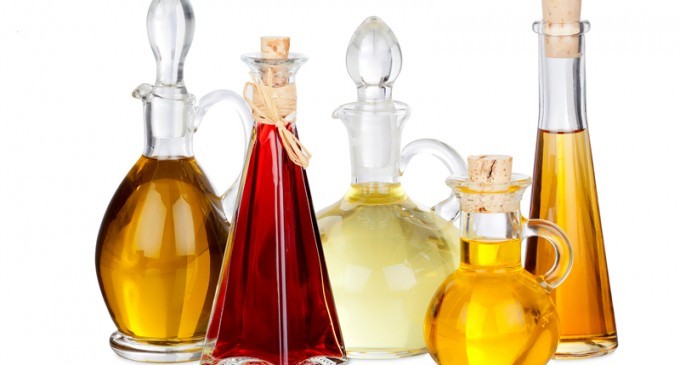
Think about what you use oil for most. Is it frying, Salad dressings or flavor? Maybe you want a more ethnic palette, or a few good meals in your arsenal? Each of the following oils have a great deal of benefits, so experiment with the ones you resonate with the most, based on your own needs,
1. Coconut Oil
I'll start with the most well-known oil alternative. Coconut oil is a hit in vegan and vegetarian communities because it can be a substitute in almost every scenario. It is the best to use in baking recipes and great to drop in to a smoothie in the morning and there are over 100 uses for it!
One advantage to coconut oil is that it is rich in lauric acid, a medium-chain fatty acid that your body burns more efficiently than almost any other fat. This makes it great energy food. What's more, the vitamins K and E in coconut oil help support healthy skin and hair.
“But how do I eat that pasty stuff?” you ask. This is where it gets fun. Coconut oil is one of the world's great butter substitutes. It melts just like butter on hot toast or pancakes, and it has a uniquely nutty, creamy flavor that many people actually prefer to butter—no, really. It is equally effective subbing for butter, shortening, or lard in baking, which is why you'll see it popping up all over “guilt-free” recipes.
2. Walnut Oil
Walnut oil is not the best to use for frying, but it is absolutely divine when used in a salad dressing. I almost could consume walnut oil raw because it is so nutty and delicious. When used in baking, especially banana bread or anything nutty, it is the best substitute. Walnut oil is bit more on the pricey side, but it is worth it to have it on hand, so invest in a bottle or put it on your next birthday list. Look for some good deals online or in farmer's markets.
When it comes to health, the walnut is king of the nut aisle. It's high in antioxidants and phytonutrients and comparatively low in saturated fat. Just a tablespoon of walnut oil has as much omega fats as a salmon filet, making it a great fat to consider if you're vegetarian or don't eat a lot of fish. And unlike most oils, walnuts are high in omega-3 acids, not just omega-6 acids.
3. Sesame Oil
Sesame oil is a great investment because you only need a bit at a time. It can be very easy to over-season. The oil truly adds an ethnic flair to any dish, and to boot it is high in Vitamin E and healthy fats. It's also used as an excellent massage oil in India.
It comes in both light and dark varieties, which are both healthy but taste very different. Light sesame oil is more subtle and can be used for frying, while dark oil is made from toasted sesames and is used more for its flavor. The darker one goes great with Korean, Chinese, and Indian foods and gives a unique nutty edge to boring chicken recipes.
4. Grapeseed Oil
Grapeseed oil is cholesterol-free, so this is a great one to use when trying to eat more consciously. It is also very cheap and not hard to find.
Grapeseed oil has a higher smoke point than many other oils, so it's good for frying and dishes that require high temperatures. Its light, neutral flavor makes it ideal for muffins, cakes, and other baked goods. It also absorbs other flavors effectively, making it a perfect candidate for infusion with garlic, herbs, or other flavors.
5. Avocado Oil
This oil tastes and looks similar to olive oil, so it is a great one to try if you are new to using alternative oils. It is a bit more pricey, but the health benefits are incredible. Avocado itself is a superfood, so put it in an oil and you have a great addition to your diet.
Avocado oil has a great fatty acid profile made up of 70 percent monounsaturated fatty acids, 12 percent omega-6 fatty acids and just 12 percent saturated fatty acids. This makes it a great option for people who want to incorporate more omega fats in their diet but are looking to keep their saturated fat intake down. It also has an unusually high smoking point, so it works great for any high temperature dish.
6. Peanut Oil
If you like to create complex stir-fries and roasts, peanut oil is an excellent choice. With this one, the fats aren’t fragile, so they don’t get damaged at high heat.Peanut oil has a neutral taste, so it’s great for when you don’t want a strong oil flavor.It's cheaper than olive oil, but with the same benefits and it is good for your heart!
7. Flaxseed Oil
Use this one for salad dressings, or drizzle on toast or in your smoothie. Flaxseed is another superfood with a multitude of benefits and it's nutty flavor is light and satisfying.
8. Hemp Oil
I saved my favorite for last! Hemp oil is my favorite for salad dressings and some cooking. Hemp seed oil has been dubbed “Nature's most perfectly balanced oil,” due to the fact that it contains the perfectly balanced ratio of Omegas, determined to be the optimum requirement for long-term healthy human nutrition. I often use it for a multitude of other uses as well, But I really like to use it when making eggs because of the flavor it gives them.
You now have a whole list of excellent oils you can introduce in your diet. You will find that they add a great deal of variety and flavors to your meal choices, in addition to adding an abundance of health benefits to your body.
Have you tried any of these? Are there any I missed?
You can find out more about alternative oils and health benefits at: Body Building.


There are no comments at the moment, do you want to add one?
Write a comment